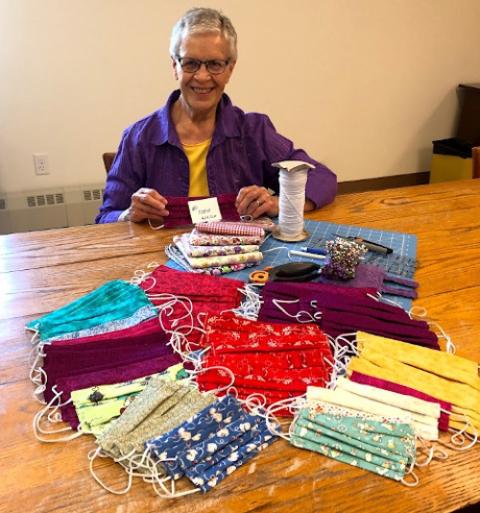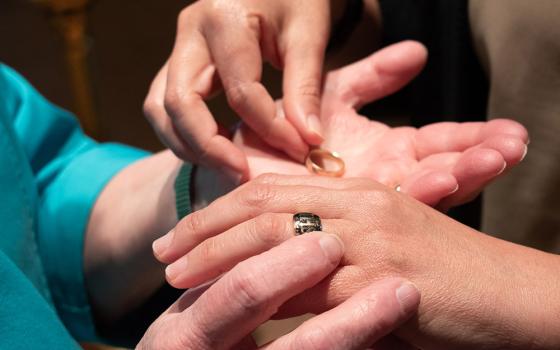
Sr. Saturnina Caccam of the Sisters of Jesus the Good Shepherd delivers food to a family in need on Saipan in the Northern Mariana Islands. The pandemic decimated the tourism industry on Saipan, but a Sisters on the Frontlines grant allowed Caccam and two other sisters to provide food for those with no income. (Courtesy of Catholic Extension)
In the hands of Catholic sisters, even the smallest grants can make a profound difference.
The Sisters on the Frontlines program began a year ago as a small pilot project of FADICA with the GHR Foundation and the Sisters of Mercy of the Americas, giving women religious $1,000 grants to help those affected by the pandemic. But it soon grew into a Catholic Extension program funded by an alliance of nonprofits with an ambitious goal of making 1,000 of those $1,000 grants, which would mean raising $1 million.
In May, 11 months after the program launched, officials announced they had reached the goal and had made all 1,000 of the grants.
"When we first talked about it, it seemed like this lofty goal. Attainable, but certainly challenging," Joe Boland, Catholic Extension's vice president of mission, told Global Sisters Report. "The alliance members were determined to make this happen."
The alliance includes the Conrad N. Hilton Fund for Sisters, FADICA, GHR Foundation, the Raskob Foundation for Catholic Activities, Sisters of Charity Foundation of Cleveland, the Crimsonbridge Foundation*, the Congregation of St. Joseph* and Sisters of Mercy. (The Conrad N. Hilton Fund for Sisters is a separate organization from the Conrad N. Hilton Foundation, which funds Global Sisters Report. Both the Conrad N. Hilton Foundation and the GHR Foundation fund the GSR in the Classroom project.)
Advertisement
A grant-making process is usually spread out over months or years, and results may not be seen until long after decisions on funding are made. That wasn't the case for Sisters on the Frontlines: Boland said the fundraising was successful because the small, individual nature of the grants made it easy to see how the grants made a difference in people's lives.
"The way it unfolded, as the money came in, the money went out, and as the money went out, the feedback came in," Boland said. "That instantaneous reflection and sharing of outcomes from the sisters helped fuel the fundraising. It's like you were watching it happen live."
For three Sisters of Jesus the Good Shepherd serving on Saipan in the Northern Mariana Islands, watching the pandemic was like watching an economic disaster happen live. Saipan is usually a haven for tourists, but after the start of the pandemic, the hospitality industry was decimated.
With a $1,000 grant from Sisters on the Frontlines, Srs. Narcisa Peñaredonda, Emma Lusterio and Saturnina Caccam purchased and distributed bags of food, masks and hand sanitizer to 25 families, and there was still enough left to pay the rent and utilities for two families with no income.
In Montana, Sr. Margaret Hogan of the Sisters of Charity of Leavenworth, Kansas, heard a parishioner's daughter was struggling: Her newborn, Emery, needed heart surgery in Seattle, eight hours away, but she and her husband also needed to care for Emery's older brother.
Hogan offered to help with a financial gift from a Frontlines grant, but the mother would only accept if there was also help for her friend, whose newborn, Adalie, needed surgery an hour away in Missoula, Montana, and who needed care for Adalie's big sister.
So Hogan helped both, and two families already under enormous stress that was compounded by distance and pandemic restrictions found life a little easier.

Benedictine Sr. Eileen Mohs poses with some of the more than 1,000 masks she made for the Red Lake Ojibwe Tribe in Minnesota. Along with the masks, she used a Sisters on the Frontlines grant to purchase filters for the community's school. (Courtesy of Catholic Extension)
Benedictine Sr. Eileen Mohs ministers on the Ojibwe Nation's Red Lake Reservation in Minnesota, and the rural community didn't have access to masks when the pandemic started.
"I had the fabric to begin making masks, so it felt like an easy thing for me to do," Mohs told Catholic Extension. "Once I started giving masks away, generous people started to give me their leftover material, elastic, or a donation to buy more supplies."
When she got a Frontlines grant, Mohs gave it to St. Mary's Mission School to purchase filters to ensure the classrooms have clean, filtered air, as many students in Red Lake have allergies, asthma, diabetes and other pre-existing conditions that make them more susceptible to serious illness from COVID-19.
Mohs has continued to sew masks through the pandemic and has now produced more than 1,300 for the community.
Boland said the stories of the grants are powerful, but there is something more important at work: sisters being the hands and feet of Christ as they minister.
"There was a man who had recently lost his eyesight, an immigrant man in Arkansas, and he was a housecleaner, so with no sight he couldn't work anymore," Boland said. "He lived with his wife and daughter, he got COVID-19 and almost died. When the sisters came over, he just started tearing up.
"His wife explained that more than anything, they were just so grateful the sisters had come to visit them at their house. 'Never in our lives have sisters visited us,' " he continued. "It meant so much to them, more than the money. They felt heard. They felt seen. That's the real power of this program. ... They're not just humanitarian workers. They also bring the church to the people they serve."
*An earlier version of this story had excluded these members of the alliance.






